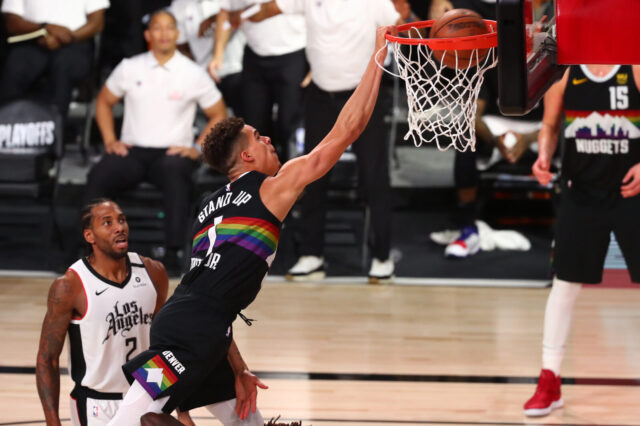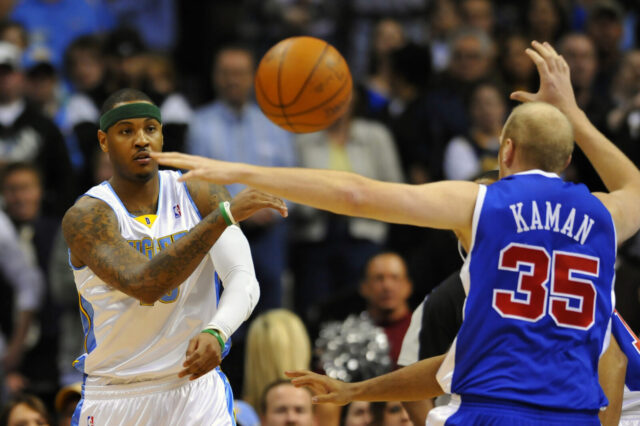When the Denver Nuggets selected Nikola Jokic 41st overall in the 2014 NBA draft, they didn’t suspect they had drafted the next face of the organization. His rise from relative obscurity to bonafide stardom has caught just about everyone by surprise, including him, so we’re dedicating this week to a celebration of that unlikely evolution here at Denver Stiffs.
In this Jokic-themed edition of the roundtable, the staff recalls their first memories and impressions of Big Honey.
Jokic is unlike most other basketball players, both in his style of play and the way he looks next to some of the world’s best athletes. What do you remember about the first time you saw him play?
Brendan Vogt (@Bvogt422): I confess, I haven’t watched Jokic’s career in its entirety the way some fans have. Born on the east coast, the Nuggets weren’t always on my radar, and by the time they had established themselves at the top of my league pass rankings, Jokic was already turning heads with his passing ability. It was December of 2016 when I truly began to follow the Nuggets, right as Malone was getting ready to hand the reigns over to Nikola. I remember laughing in near disbelief, as a man who looked as vertically challenged and easily winded as my middle-aged father schooled NBA athletes routinely. He could barely run, he couldn’t jump, his physique was soft. It didn’t make sense. It still doesn’t.
Adam Mares (@Adam_Mares): The summer of 2015 was an interesting time for the Denver Nuggets. They were fresh off one of the worst seasons in recent history and the front office was starting to receive harsh criticism from some prominent voices in the national media. At the time, the only truly bright spot on Tim Connelly’s resume as a new GM was Jusuf Nurkic who was coming off of an impressive rookie season. So when I first saw Jokic at summer league in Las Vegas, all of my thoughts were centered around how he’d fit alongside the team’s center of the future. Little did I know that Jokic would not only replace Nurkic as the face of the team, but Connelly’s reputation would also begin to flip, largely on the back of the Serbian phenom who he found in the 2nd round.
Gordon Gross (@GMoneyNuggs): The first place I saw him was draft day highlight packages from deep on Youtube. He had a nice (if slow) three point shot and was built like an inflatable parade balloon. He then destroyed the Adriatic League which raised my curiosity beyond “he’ll probably never come over” to “he might be a decent bench big behind Nurkic if he drops 30 pounds.” Then I saw him pass the ball in Summer League and he fit every stereotype of Euro big men who probably can’t hold up against the athleticism of the NBA: great basketball IQ, slow-footed, good shot, can’t block a grocery line at the supermarket. It wasn’t until he played in real NBA games that I finally started getting giddy.
Ryan Blackburn (@NBABlackburn): I remember the first time seeing Nikola Jokic play was trying to catch Emmanuel Mudiay’s first minutes as an NBA player in Summer League prior to both of their rookie seasons. While Adam Mares had boots on the ground in Las Vegas that year, I was watching from home. It was clear from the first minutes watching him that there was so much skill there. The way he thought through plays in a scrimmage setting, how he moved (even as slow as he was), and how he passed the ball. Mudiay was the main attraction while down there, but Jokic came over from Europe and proved immediately that he was an NBA player. For a 20-year-old second round pick, that was very impressive.
When did you first start to like Jokic as a player? Is there a moment, or a game, that stands out for you as the start of your appreciation for the Joker?
Vogt: It was four days after the 15th of December, 2016—Jokic day, as it really should be known. The Nuggets were playing the Mavericks. At this point I knew I wanted to follow the team closely. I had started writing on them for Hoops Habit, and I had enjoyed watching Jokic in the two games prior. He went off. 27 points, 17 rebounds and 9 assists, all while barely leaving the ground. I was hooked.
Mares: It only took two summer league games for me to be sold on Jokic as an NBA player. I don’t think I knew anything about him prior to seeing him for the first time back in July of 2015 but as soon as I saw his skill set, I was a fan. His numbers didn’t jump off of the page but I remember him reading the court better than everyone on the court, including rookie point guard Emmanuel Mudiay and reigning summer league MVP, Ian Clark. Jokic knocked down threes, thew phenomenal passes, and showed off great touch and footwork in the post. Turns out it was just a preview of what was to come.
Gross: I was later to the party than Adam. Nobody plays any defense in Summer League and I wanted to see him play against some legit bench bigs in real games to see if the passing would hold up or if he could defend at all. It was probably that November Spurs game in 2015 that made me really take notice that he was going to be legit in this league. Not a star necessarily, but far exceed his draft position. He scored at will with a 20 / 10 double-double and you could see his hands were the opposite of poor Mozgov’s: they grabbed everything. A big who finished in the paint (something Nurkic and previous Nuggets bigs struggled with funnily enough) and could vacuum the boards with a nice eye for passing? Sounds great. But I still didn’t understand his game.
Blackburn: I’m with Gordon. The game against the San Antonio Spurs in his rookie season proved exactly what he could be. His short floater game was on point, and he made some great passes to set up the offensive flow. What many don’t remember is that he blocked Kawhi Leonard once and LaMarcus Aldridge twice, showing foundations of good defensive play from an early age. Now that he’s excelling on defense this season, it makes some of the “sieve” talk about his defense look silly.
When did you first realize that Jokic was the best (or soon to be best) player on the roster?
Vogt: I wanted to see Jokic lay it down as a scorer. It was clear to me that he was the most important and well rounded player on the team already, but with Murray and Harris on the roster, I wasn’t sure how long Jokic would hold the title of best player. Then, in February of 2017, he dropped 40 points on 17-23 from the field against the Knicks. That’s when it hit me. This wasn’t just some flash in the pan. The ceiling was even higher than I thought. Jokic was going to be the best player on this team for a long time.
Mares: I don’t think I remember a specific moment that sold me on Jokic being the guy but I do remember it was early in his rookie season. I remember him scoring 23 points against the San Antonio Spurs about a month into his rookie season and looking very impressive as a low post scorer but it wasn’t until a month later that he strung together several performances in a row that really caught my attention. He was only playing about 20 minutes per game but he filled up the stat sheet and mixed in a few highlight passes that made me realize he was special.
Gross: It happened fast. The second half of his rookie year he was ripping off a string of double-doubles, many of them over 20 points, while tossing a handful off assists in only 20 minutes or so a game as Adam said, and I was a believer. Some players are just magic on a court. Nothing about Nikola looks like an elite basketball player – until you put a ball in his hands in a live game. By that summer I was already talking about him keeping pace with Karl-Anthony Towns and being better than Kristaps Porzingis. There wasn’t a way to play Jokic and Jusuf Nurkic together (as Denver would discover to their chagrin) but they made the right call to put their faith in the seven-foot Serbian as the lynchpin of their team.
Blackburn: For awhile, I was on the “wait and see” train with Jokic. He still had his faults as a player, and Danilo Gallinari had scored pretty well during Jokic’s rookie season, so well that I had Jokic second to Gallinari as the best player to start the 2016-17 season. As soon as the Nuggets moved Jokic to the bench that year was when it became clear that he was Denver’s best guy. Jokic had volunteered to come off the bench after the team’s poor start (Jusuf Nurkic did not, mind you) and with that show of selflessness, the bench immediately flourished, while the starting unit took a nose dive. It’s why December 15th holds so much significance – Michael Malone finally gave way to the “start Jokic” train that had already left the station.


